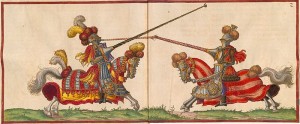 According to chronicler Edward Hall, it was on 12th January 1510 that Henry VIII jousted for the first time as King. The joust took place at Richmond Park and was a private event. The King and his friend, William Compton, both attended the joust in disguise and this led to confusion and panic in the end.
According to chronicler Edward Hall, it was on 12th January 1510 that Henry VIII jousted for the first time as King. The joust took place at Richmond Park and was a private event. The King and his friend, William Compton, both attended the joust in disguise and this led to confusion and panic in the end.
Here is what Hall writes:
“The kyng ranne never openly before, and there were broken many staves, and greate praise geven to the two straungers, but Specially to one, whiche was the kyng: howebeit, at a course by misfortune, sir Edward Nevell Esquire, brother to the Lorde of Burganie,- did runne against Master Cumpton, and hurte hym sore, and was likely to dye. One persone there was, that knew the kyng, and cried, God save the king, with that, all the people wer astonied, and then the kyng discovered hymself, to the greate comforte of all the people.”
One of the disguised men had been seriously injured by Sir Edward Neville, and the person that knew that the King was jousting in disguise was not sure whether the knight in question was Compton or the King. The King was forced to remove his disguise to show everyone that he was unhurt. William Compton survived the accident and served the King as his Groom of the Stool until Wolsey’s Eltham Ordinances forced his resignation. He died in June 1528 after contracting sweating sickness.
Not long after that joust, the King and twelve of his men disguised themselves as outlaws, or Robin Hood and his men, and surprised Queen Catherine and her ladies in the Queen’s chamber. After “certain daunces, and pastime made”, the King and his men departed. This was the King and Queen Catherine of Aragon when they were happy.
Notes and Sources
- Hall’s Chronicle, Edward Hall, p513